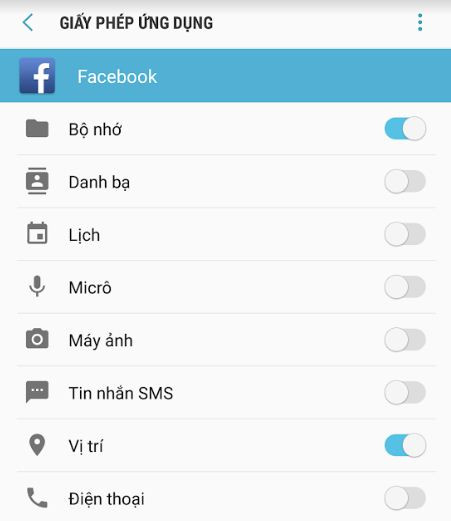How to hide sensitive personal information on Facebook
How can Facebook not track you, not know where you are, meet someone and do what?
Facebook is suffering from an unprecedented scandal in this social network history. The crisis came from Cambridge Analytica. The analytics company used data from 50 million Facebook users to direct their behavior and intervene in political decisions.
Facebook's abundance has led to a wave of protests in the US and many European countries. Thanks to this, the public is becoming more and more interested in securing personal information on Facebook.

To be more secure on Facebook, hide your own information.
No one stands outside the crisis. Just by using Facebook, WhatApps or Instagram, your personal data is in Mark Zuckerberg's hands. Here's what you need to do right away to protect your data.
Step 1: Turn off location on Facebook
Location data is a very sensitive information. With location and location data, people who know this information can know where you usually go, your home address and your daily workplace. This is an invaluable source of data for advertisers. However, it has a terrible danger for users.
To protect your privacy, it's best to stop Facebook from collecting that information.

Go to your phone's Settings section and remove Facebook's location information.
If you are using an iPhone, you can go to Settings, go to Security and select Location Services. Then, disable this feature with Facebook and 3rd party applications that you feel are not safe.
With Android, go to Settings >> Applications >> Facebook. Then scroll down to Install applications, go to the Permissions section and turn off the location feature of this social network.
Step 2: Delete problematic 3rd party applications
Facebook itself is a fundamental environment for the operation of applications. In the process of using Facebook, from access to games, links and countless other forms, users have inadvertently allowed applications to access their Facebook database. This is also a great threat when no one knows what developers will do with that data.

Visit the Facebook Settings section, you will find that you have granted permission for many third-party applications developed.
To solve this, users should go to the main Facebook Settings section (accessible both on the web and mobile). Then, select the Application section. There will be a list of a number of 3rd party applications you have ever allowed to access your Facebook database. Re-read them one at a time and remove the strange names or make you feel suspicious.
Step 3: Limit viewers
Facebook has a feature that allows people to access your post. This option appears immediately below the posts section.
If you don't want anyone to be exposed to private information, limit the number of people who can see this content. It could be Facebook friends or simply a limited selection of friends.
Control the number of people who access to the posted content more carefully, users will be safer on social networks.

Limit the number of people accessing the post to protect your privacy.
In addition to limiting viewers, you should also have deeper settings. Those are the options related to who can tag them or post them on your wall. Certainly, no one wants unwanted ads to be posted on their personal Facebook page.
To control this, visit the Settings section on Facebook itself. Then, select Timeline and tag and edit the default options to the mode you want.
Step 4: Hide personal information

Users should share personal information in a selective way to ensure privacy.
In the personal profile (Facebook) tab, users can set options to display where they live, their work history, home address, phone number or email. These data make it easier for friends to contact you. However, it is also an opportunity for those with bad intentions.
You can hide private information such as phone numbers, emails and home addresses to protect yourself.
Step 5: Install advertising restrictions

Facebook understands you better than yourself.
With the huge data warehouse holding, Facebook really understands you better than yourself. Facebook doesn't collect money from you, but this social network collects money from businesses that want to buy your data to advertise their products.
There must be again. However, not everyone is interested in encountering a lot of advertising information on Facebook. To resolve this nuisance, find the Ads Preferences section by clicking here, then choose yourself whether or not to allow Facebook to advertise based on your interests and interests. .
- Why is personal information revealed so important?
- Hackers attack Facebook, 50 million accounts are affected: What should be done at this time?
- 2 changes of Facebook made fans fan
- Facebook is collecting data from everyone, even when not logged in
- Microsoft instructs security of personal information
- Wearable items may reveal personal information
- How to prevent Facebook from collecting user information to advertise
- Utility to protect personal information
- Methods of protecting personal information with solid passwords
- 12 extensions that people addicted to Facebook need to have
- 15 interesting things about Facebook you may not know yet
- 200,000 HP employees were taken personal information
 What is the Snapdragon SiP chip?
What is the Snapdragon SiP chip? How to create a yellow circle around the mouse cursor on Windows
How to create a yellow circle around the mouse cursor on Windows Edit the Boot.ini file in Windows XP
Edit the Boot.ini file in Windows XP 3 ways to restart the remote computer via the Internet
3 ways to restart the remote computer via the Internet 10 'miracles' that will happen when you limit your use of Facebook
10 'miracles' that will happen when you limit your use of Facebook  Facebook company changes name to Meta, launches virtual universe
Facebook company changes name to Meta, launches virtual universe  Instructions to upload and delete phone contacts on Facebook
Instructions to upload and delete phone contacts on Facebook  How to turn off online status completely on Facebook and Facebook Messenger?
How to turn off online status completely on Facebook and Facebook Messenger? 